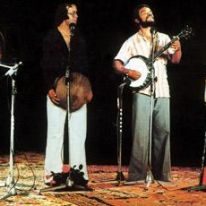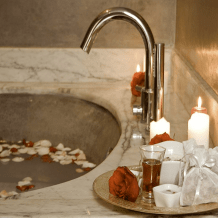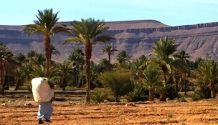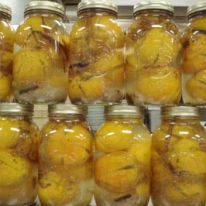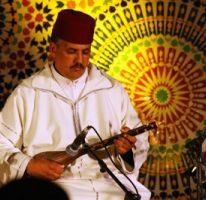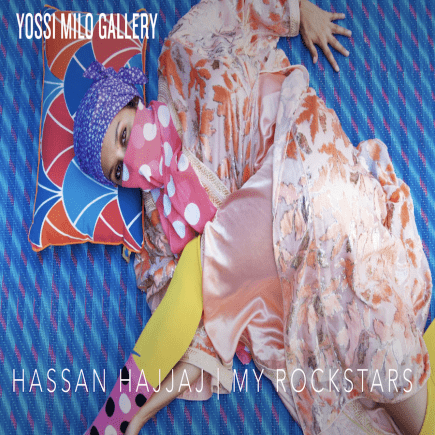
The Moroccan artist Hassan Hajjaj has wasted no time during the pandemic in resuming the worldwide exhibition of his series “My Rockstars” currently on display in New York at the Yossi Milo until May 29th, 2021. “My Rockstars” brings together five series Hajjaj has developed over 30 years inspired by the local cultural context of Morocco.
“I always hope with our region I’m doing something positive, something that there’s some truth to, there’s some set-up, something funny, but I’m not making fun of our region or our own people. I want to be able to present this in a positive way, because, you know, we have a lot of negative things [to deal with],” claims Hajjaj. He did not want to share details about his pieces to give his audience the freedom to view the work from their perspectives. However; he mentioned that the title of the exhibition was chosen as a reflection to showcase to westerners another angle of the Arab region.
“So, for the viewer, when they see the work, they can see maybe something bizarre, something good, something cool, something scary, but I let them decide what they think of the show and how they see this issue,” says Hajjaj. The exhibition attracted attention from across the globe and his work was described as “distinctly valuable” and “lively.”
In the Vogue issue interview, Hajjaj conveys, “I always wanted to show my friends something from my native country, Morocco.
In the Vogue issue interview, Hajjaj conveys, “I always wanted to show my friends something from my native country. They came from places like the Caribbean, Brazil, and India,” he said, “places brimming with cultural belonging familiar to everyone: reggae, samba, calypso, rai-music, and more. I wanted them to know that I was also from a cool place, so I created things, graffiti, and scenarios, that I shot with a borrowed camera. Things that mixed the Moroccan with the vibrant London that we all lived in.”
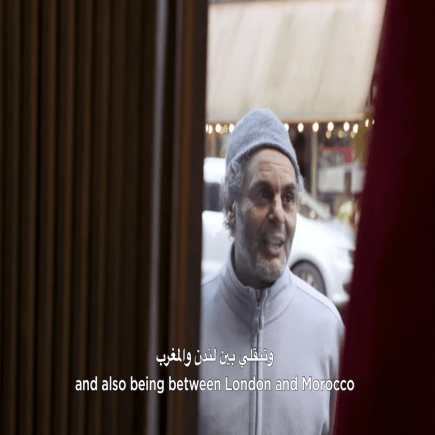
Hajjaj was born and raised in the small fishing town of Larache, in northern Morocco, until the age of 12 when he moved to England. He dropped out the school at the age of 15, sold flowers and clothing. Then in 1984, he started R A P (for Real Authentic People) a clothing label showcasing streetwear. He continually found himself wanting to plant his own seed of culture in foreign lands.
Hassan Hajjaj designs and styles the outfits featured in his works, making use of loud colors and dazzling pattern schemes, resulting in personas full of life appearing through the lens of his camera.
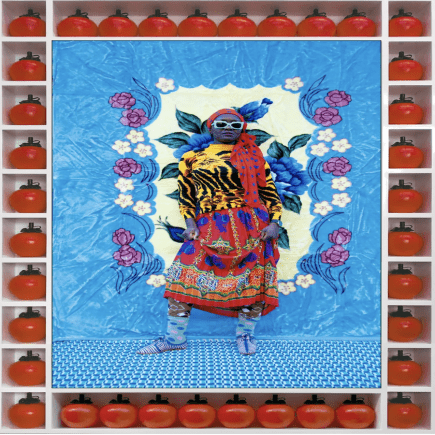
He started to see the fruit of his work taking off after he returned to Morocco in the 1990s resulting in him splitting time between the UK and Morocco since, including during the pandemic.
He recently collaborated with Amine El Baroudi, president of the Imperial Society of Teas and Infusions (SITI), in launching his brand of tailor-made products called “Jajjah” – his surname spelled backward, and investing in an adjoining space of more than 350 square meters in Sidi Ghanem, Marrakech. The space is dedicated to the exuberant world of Hassan Hajjaj and will host a tearoom, a restaurant featuring local street food, as well as an exhibition area and a boutique.
For those drinking at home, he is also developing an app that will match mood music to the ten types of tea he created with packaging to be made of prints by other Moroccan artists he would like to promote. The project is very much in line with the ethos he has previously espoused of giving back to the city he calls home.
“It made me realize that if there’s any opportunity you can take to make some kind of change for yourself and to also employ people then there’s a nice satisfaction to it.”
Hajjaj is also working on his documentary, Brotherhood, a project that has been 20 years in the making about the musical heritage of Gnawa; the Moroccan poetry, dance and religiously inspired music genre, and Capoeira, the Brazilian martial art that is similarly made up of dance, acrobatics and music.
The first half of the film was shot in Morocco,. Hajjaj is waiting to continue shooting the other half of the film in Brazil once borders reopen. Meanwhile, it has already been accepted to the next Sharjah Biennial.
Hajjaj says he is happy his creative juices kept flowing during the pandemic and is looking forward to showcase what he has been working on once the world goes back to “normal. “I think it’s good to kind of just, you know, believe in yourself and stay creative and try and finish off some projects,” he says.
The pandemic taught Hajjaj to be adaptable with any kind of situation and to think out of the box. “You have to kind of be ready for the changes, you know, whatever comes your way.”

